The best comedy specials on Netflix
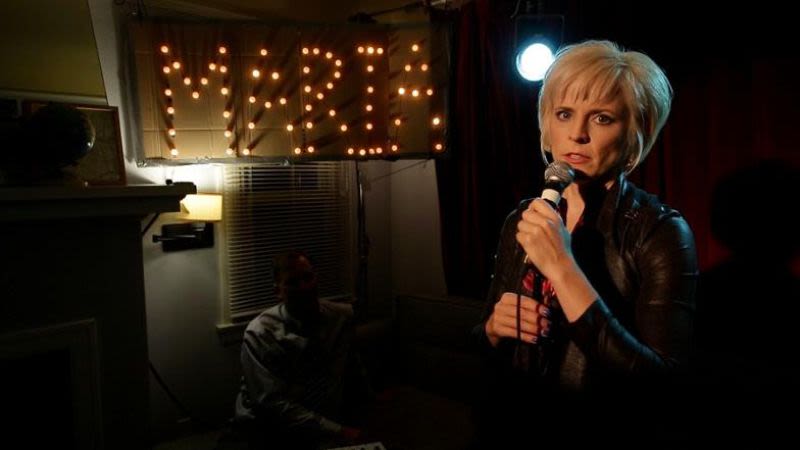
Streaming libraries expand and contract. Algorithms are imperfect. Those damn thumbnail images are always changing. But you know what you can always rely on? The expert opinions and knowledgeable commentary of The A.V. Club. That’s why we’re scouring both the menus of the most popular services and our own archives to bring you these guides to the best viewing options, broken down by streamer, medium, and genre.
We’ve narrowed down our picks for the best comedy specials on Netflix based on those that were given a B+ or higher in an A.V. Club review. (We’ve also thrown in a few vintage specials that we didn’t review but that we have praised elsewhere on the site.) If the excerpts and blurbs aren’t enough explanation for why we’re so keen on a certain special, click on the linked titles to read more. In general, we tried to limit the selections to one stand-up special per comedian, but then somebody had to go and find a loophole by making multiple kinds of recommendable specials.
Looking for something else on Netflix? Check out our list of the best drama series, comedy series, sci-fi/horror/fantasy series, documentaries, and movies on the streaming service.
As a racial justice advocate and the host of The United Shades Of America, W. Kamau Bell can’t help but get political in his stand-up. Accordingly, Private School Negro has many solid knocks against the detainer in chief, whose incompetence is so indisputable that Bell’s preschool-age daughter questions how he could have the most important job in the country. But if you’re looking for a progressive echo chamber, you won’t find it in this thoughtful special. Private School Negro is full of rightful criticism, but it’s also compassionate. Thanks to the center placement of the stage, Bell literally stands in the midst of his audience as he describes performing in the Midwest and American South, where he listened and learned to “expand our ideas of what an American is so we don’t think of others as doing ‘American’ wrong.” The next time someone disingenuously scoffs about the disappearance of the “tolerant left,” direct them to this special. []
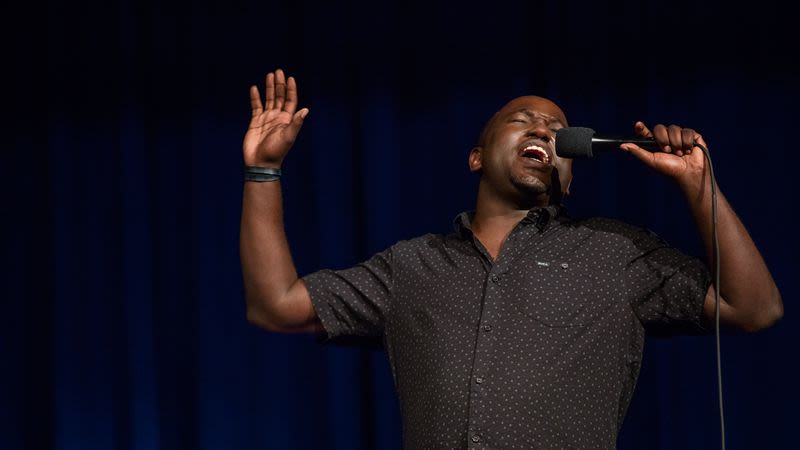
A camisado is a nighttime sneak attack. It’s also an apt description of Hannibal Buress’ comedy style. With his gravelly mumble and perpetually sleepy eyes (he describes himself, post-Lasik, as “sorta like how Milhouse from The Simpsons looks without his glasses”), Buress sounds like an amiable stoner, or, like his character, someone so laid back that he’s entered another plane of existence entirely. Indeed, in performance, Buress weaves in and out. Not in clarity—Buress’ comic voice is strong and focused—but in the way he approaches his subjects, coming in at odd angles, landing a joke with a solid snap, then riding his singular delivery to the next target. Unlike comics who rely on performance and attitude to carry substandard material, Buress’ jokes emerge inextricably linked to his persona. [Dennis Perkins]
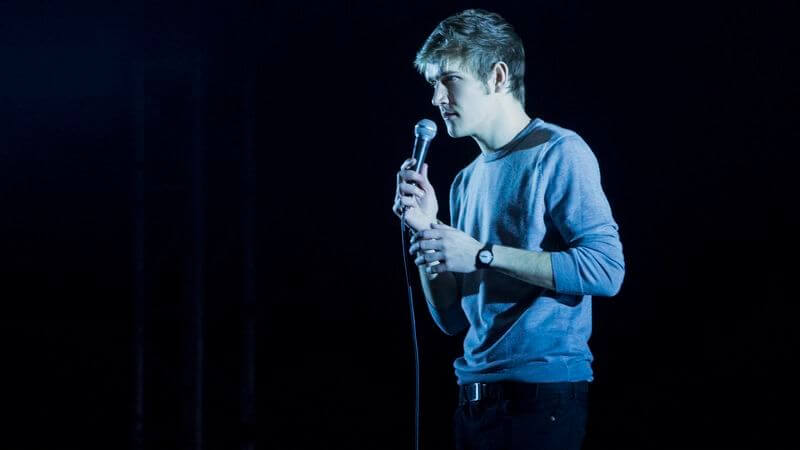
The central thesis of Make Happy is that all entertainment—good or bad—is ultimately fleeting, and exists to momentarily provide us with a bit of joy and relief from our stressful lives before we resume the struggle. Even if Burnham’s act is more worthy than Lip Sync Battle, he still has the same goal: to distract us from the harsh realities of the modern world, be they famine, death, or the continued prosperity of Guy Fieri. While this observation is accurate, it does nothing to detract from the quality of Make Happy. Burnham is a skilled comic and his combination of rapid-fire songwriting and meaty observations about modern life are captivating. After displaying serious potential early in his career, Burnham has grown up, and the results are stunning. [John Hugar]
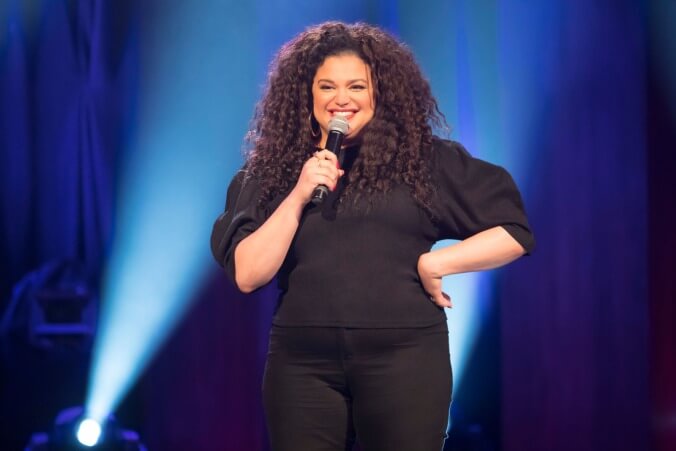
Michelle Buteau radiates warmth and intelligence in any setting, whether it’s in studio for a taping of her Late Night Whenever podcast, or onstage with 2 Dope Queens’ Phoebe Robinson and Jessica Williams for their four-special run on HBO. She’s quick with a smile and a quip, and tells the story of her engagement with such passion and hilarious details that you’d think it had just happened yesterday. Turns out, she’s been married for seven years, but because she’s still paying off the wedding, it feels much more recent. Although she’s able to find plenty to laugh and smile about, even in this darkest of timelines, Buteau is also ready to engage in a few uncivil acts of protest. Farting on your Trump-voting gynecologist during a pap smear might not be taught in activist workshops, but it should. []
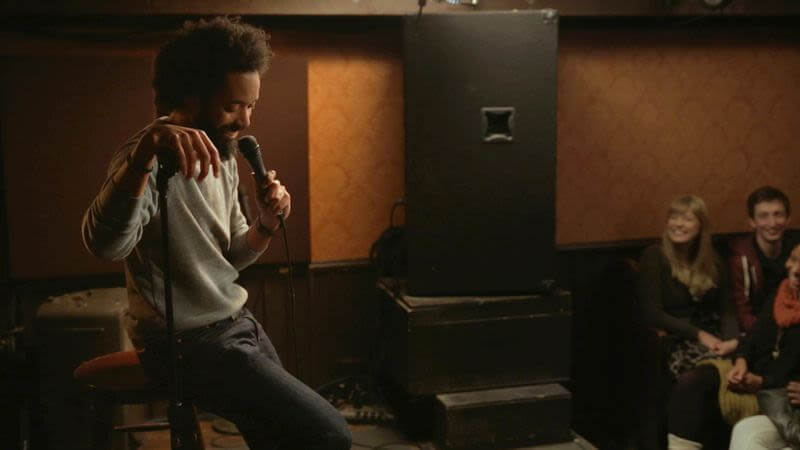
As the title suggests, the majority of the material in Brooklyn focuses on life in New York City. While some may be automatically turned off by the region-centric comedy, neither Cenac nor the material come off exclusionary, even when he’s discussing the differences between Crown Heights and Fort Greene. The shots of Brooklyn that bookend the special actually invite the audience into both Cenac’s backyard and his worldview. Besides, Cenac’s regional humor produces some of his best, funniest insights on a variety of issues, such as his problems with gentrification and his personal experiences growing up in Brooklyn. The special also contains one of his best bits, about the awkwardness of engaging with a doorman his own age and race: “I’ll tell you a little secret about black dudes in their 30s: We don’t respect each other.” [Vikram Murthi]
Nanette begins as recognizably standard stand-up. So it seems like a bit when she says, about 15 minutes in, “I’ve decided to quit comedy.” But it’s not a bit at all, and the ride Gadsby takes the audience on moves through van Gogh’s sunflowers and Picasso’s many-perspectived faces and growing up gay in a city where homosexuality was a crime until 1997. Nanette evolves, in just over an hour, into an intimate, raw come-to-Jesus between Gadsby and her audience. Gadsby says she needs to tell her story, and from that point, Nanette boils with real anger as she re-tells jokes that have been frozen in time—but now, unburdened of the need to be funny, the jokes thaw into gut-wrenching stories. Nobody emerges unscathed, least of all the audience. Even watching it on Netflix from the comfort of your sofa doesn’t provide much distance from Gadsby’s fury—once she begins to unravel her story, she untethers herself from the comedic obligation to resolve the tension in the room, and the free fall that ensues will stick with viewers long after the credits. Gadsby is a brilliant writer and has a knack for revealing truths, but there’s one thing she’s wrong about: when she says you won’t come out of her show a better person. []
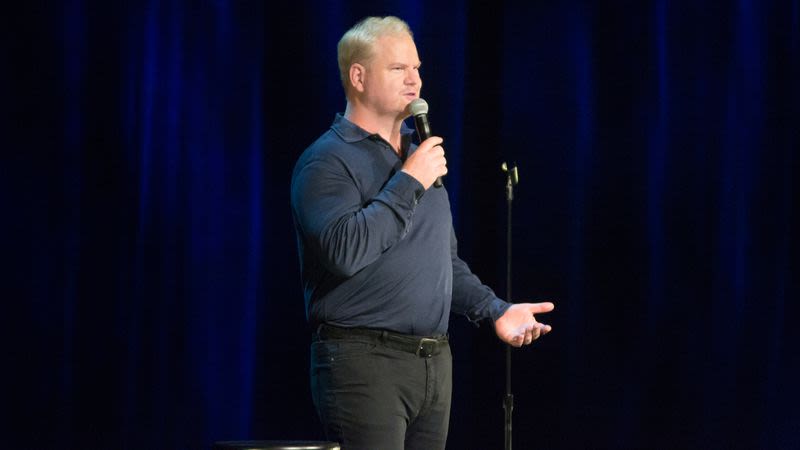
In Cinco, Gaffigan focuses on the topics that have been his bread and butter throughout his career: food, family, and the general awkwardness of everyday life. There’s also plenty of Gaffigan’s signature schtick, where he imitates an audience member who is unimpressed with his material. Those staples are here on Cinco, but it’s hard to fault Gaffigan for being formulaic when the formula works so well. A Gaffigan set is like a really tasty steak dinner; you know what you’re getting, but that doesn’t stop you from anticipating it. [John Hugar]
From : Zach Galifianakis has never released a comedy album, but any talk of stand-up genius in the ’00s would be incomplete without him. So if you must, close your eyes and pretend that his lone purchaseable release, the DVD Live At The Purple Onion, is a CD, but don’t ignore it. Not only does it feature some of the bearded actor’s confrontational stand-up—complete with long portions in which he accompanies his jokes with light piano—but also a mini-documentary interspersed throughout in which his rube of a “twin brother,” Seth, is interviewed by NPR’s Brian Unger. It’s mad genius. [Josh Modell]
From our AVQ&A about : I’ve never smoked pot, I’ve never dropped acid, I’ve never snorted coke, and I continue to live my life without ever having indulged in heroin, but if I’ve ever been tempted on any of these fronts, it wasn’t because of peer pressure, but rather because of , who, while stalking the stage of Chicago’s Old Vic Theater during his HBO One Night Stand special, dared to go out on a limb and reveal, “I have taken drugs before, and… I had a real good time.” In fact, he offers a lot of profound pro-drug discussion during the course of this 30-minute special, including the reminder that your music collection wouldn’t be the same without drugs (“The Beatles were so high, they let Ringo sing a couple of tunes”) and the theory that pot is better than booze. (“If you’re at a ball game or a concert, and someone’s really violent and aggressive and obnoxious, are they drunk, or are they smoking pot?”) But it’s Hicks’ mock apology for his past pharmaceutical transgressions that almost sold me on indulging a bit myself, specifically when he lays it on the line about the things that didn’t happen when he was under the influence. As he dances around the stage, smoking all the way, he gleefully announces, “Didn’t murder anybody, didn’t rob anybody, didn’t rape anybody, didn’t beat anybody, didn’t lose one fucking job, laughed my ass off, and went about my day.” Then, after taking a long drag on his cigarette, he shrugs and says, “Sorry!” In conclusion, he looks straight into the audience and asks, “Now… where’s my commercial?” Fact: If Bill Hicks had actually made a proper pro-drug TV ad, I’d almost certainly be high right now. [Will Harris]
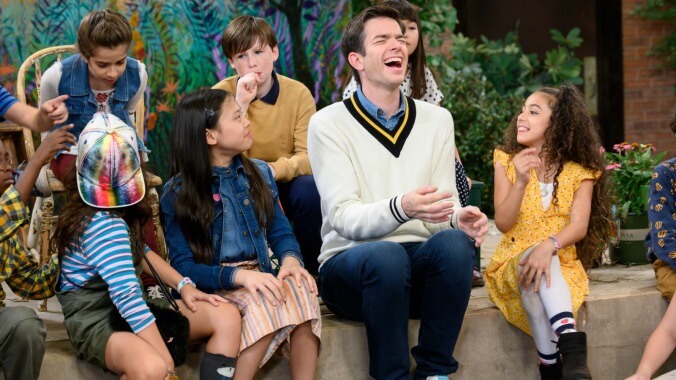
Like a 12-year-old thumbing through the paper in a corner booth, John Mulaney & The Sack Lunch Bunch lives in the space between childhood and adulthood. It’s a realm where school-age moviegoers readily identify the voice of Mandy Patinkin—and are eager to say so in a focus-group setting. The most superficial read on The Sack Lunch Bunch: “Educational” comedy whose syllabus is all back issues of People and the New York Post. But if that were the only mode Mulaney and Sawyer (plus director Rhys Thomas and “” composer Eli Bolin) were working in, the special wouldn’t be worth remarking on. There’s a captivating curiosity at the core of The Sack Lunch Bunch, a search for answers about inattentive adults, picky eating, and whether or not flowers exist at night. (The song about that last subject should come as a free download with every purchase of .) Giving voice and theatricality to these questions is key to The Sack Lunch Bunch’s comedy. The punchline, and the epiphany, is that some answers never come, no matter your age. [Erik Adams]
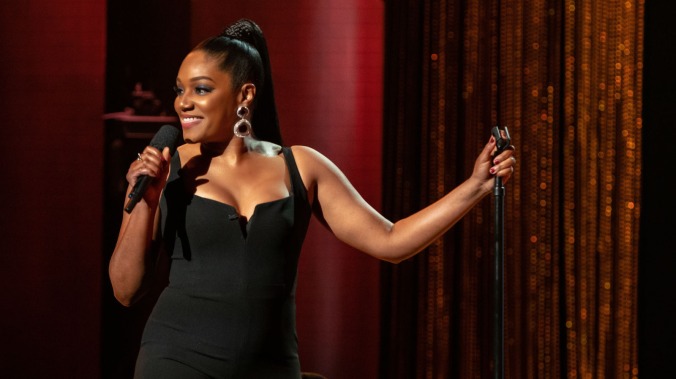
Haddish’s ability to tell a funny, relatable story—where she described taking a swamp tour with Will Smith and Jada Pinkett Smith—garnered her fans because it gave us a glimpse into a situation few of us could imagine. She brings that same charm and likability to Black Mitzvah as she casually jokes about borrowing a suit from Beyoncé’s mom and getting calls from Kevin Hart, Sinbad, and Oprah after her bomb in Miami. Still, the material never comes across as out of touch—it’s more like your best friend cracking jokes about the time Drake’s dad hit on her. [Ashley Ray-Harris]
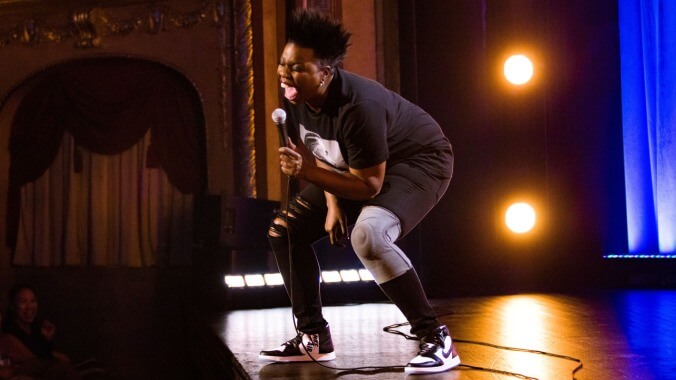
Now 52, Jones uses Time Machine to look back and offer wisdom to viewers. While breaking down her life by decade, Jones focuses on reminding audiences to have as much fun as they can, while they can. This isn’t hard to do when Jones is having so much fun herself—and when she stops twice during the special to drive that point home, you absolutely feel it. Her departure from SNL makes sense when you see how genuinely happy stand-up comedy makes her. She always brought energy to the show, but she’s truly in her element doing stand-up, pulling every bit of laughter she can from her pronunciation of a phrase like “man ass.” [Ashley Ray-Harris]
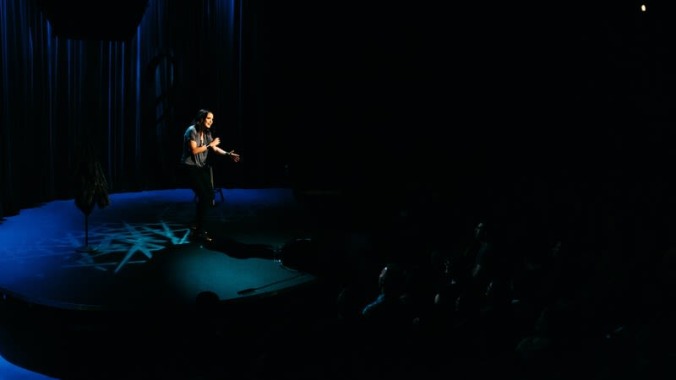
On the heels of her 40th birthday and her 2013 memoir, I Can Barely Take Care Of Myself: Tales From A Happy Life Without Kids, Kirkman is hashing out thoughts on being divorced and childless in a culture that doesn’t know how to deal with either of those things. The end result is a nicely discursive hour-plus of standup, one that covers familiar topics but stands out due to material that sounds bitter without being embittered. As the title implies, there’s no regret to any of this, just the feeling of getting a bunch of frustrations off her chest before the effort of thinking about them too much drives her crazy. [Les Chappell]
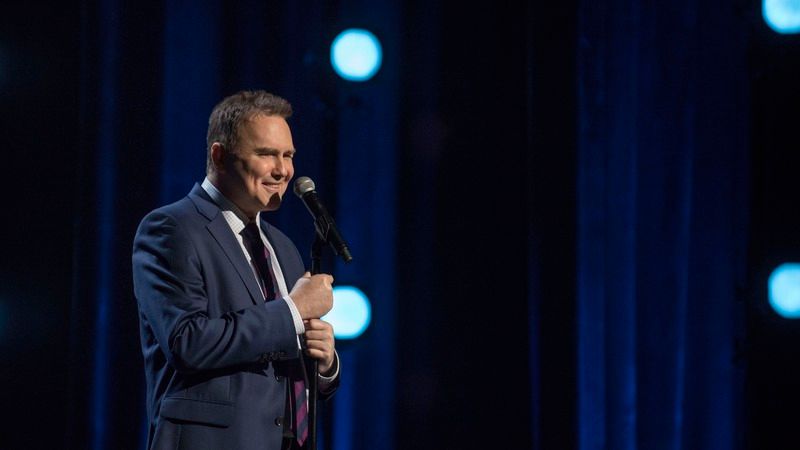
Bits on LSD flashbacks, the moon landing, and the evils of Nazi Germany could all be musty, but here take on a sort of older-comedian classicism when Macdonald manages to find fresh premises and punchlines for Hitler jokes. He also talks a lot about aging, and it’s the old-guy material, when he gets into how things used to be, where Hitler’s Dog is a bit more clever and less regressive than his brilliant but uneven previous special. Macdonald sounds playfully reflective about, say, the advent of previously unthinkable mobile phone power, instead of going to the kids-these-days well. [Jesse Hassenger]
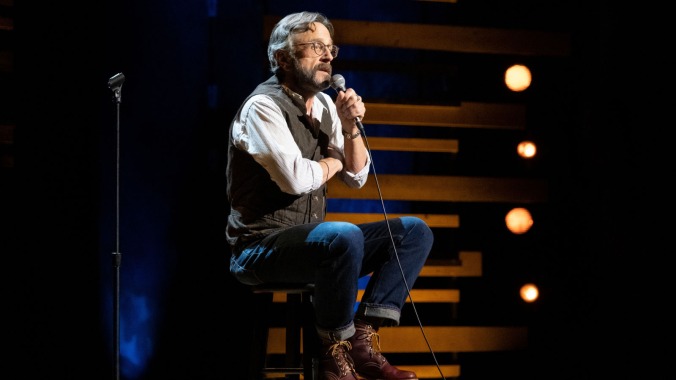
Directed crisply and unobtrusively by longtime Maron collaborator , End Times Fun is largely static, with performer and director aware that watching Maron’s mind whirr while his body stays largely hunched on a center-stage stool is what people are there to see. There’s no crowd work to speak of, although a Marc Maron set is an exercise in listening for Maron’s oblique references to you in the audience, either as co-conspirators or targets for whom he yet maintains some grudging sympathy. Segueing into some overtly political material, Maron notes that there are unlikely to be many Trump supporters in his traditional demographic before saying half-apologetically, “If there are, it’s not your night.” The former Air America host only occasionally attacks specific political topics head-on, chiding Obama-era liberals for complacently “working on me” while conservatives were busy “chipping away at state and local government.” Instead, Maron’s concerns are more with root causes and human failing, something he’s all too willing to ascribe to himself as well. Speaking of his attempts to be a feminist ally, Maron sums up his position as “85 percent woke, the other 15 percent I keep to myself,” which, in Maron’s droll, self-deprecating worldview, is about as good as human males can get. [Dennis Perkins]
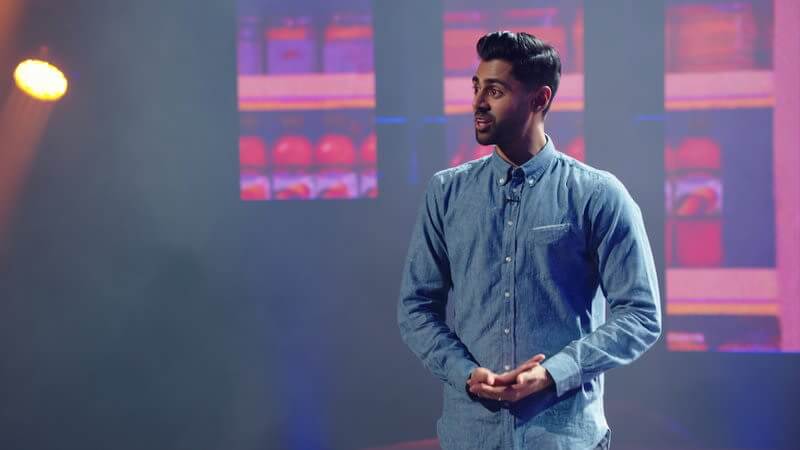
Minhaj, with his boyish handsomeness and his California bro’s swagger (the special is filmed in Minhaj’s hometown of Davis) comes out of the gate dropping a clutter of pop cultural signposts (Drake, YOLO, comic books, #blessed, and the like) that belie the tightly written, startlingly heartfelt nature of his show. Making great use of a strategically deployed slideshow backdrop for emphasis, Minhaj takes us on a whirlwind tour of his life growing up alone until the age of 8 with his chemist father, his mother having remained behind in India to finish her medical degree. While comedians making jokes about their parents’ eccentricities isn’t new, Minhaj locks onto his theme of father-son conflict with a deceptively light touch that carries through the entire set. When a friend’s parents ask the teenaged Minhaj what he really likes to do, he answers, baffled, “No one has ever asked me that before,” referring to his father’s quick hand and rigidity as “a Guantanamo of the mind.” [Dennis Perkins]
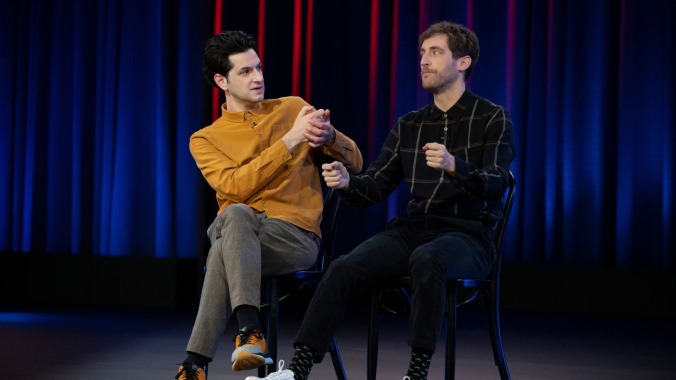
There is nothing more excruciating than watching bad improv. But the joy of improv is that the same thing will never happen again—even if things go really haywire, it can be left behind in that blackbox theater with the possibility of greatness the next time around, wiping a bad set clean. Perhaps that’s why it’s an art that’s rarely committed to film in its most basic form, mostly existing in our public consciousness as something that sitcom actors and Christopher Guest characters are allowed to do on set. Even then, it might be rehearsed or tweaked or left on the cutting room floor altogether. Depending on the audience, the suggestions, and the way the performers vibe on any particular night, it could be a huge risk to say, sell a live improv special to Netflix. It’s a risk that Thomas Middleditch and Ben Schwartz were willing to take, and thankfully their three-episode special is an example of improv at its absolute best. [Brianna Wellen]
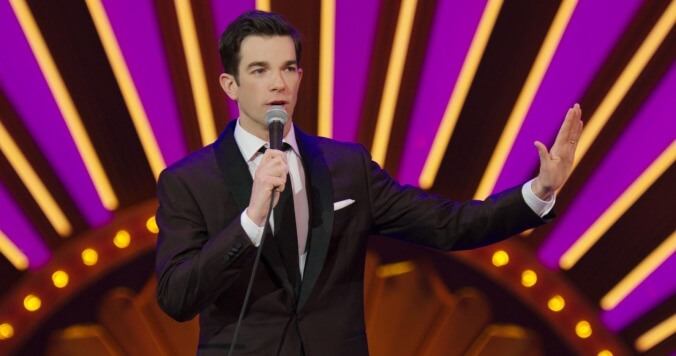
Like a lot of stand-ups, Mulaney’s comedy traffics in unmasking absurdity. But he is unmatched at building his dissection of ludicrousness (school assemblies, college, aging, manners, church) on an escalating series of hilariously observed, unerringly specific details. Talking about being scolded by his grade school principal for laughing at a guest speaker’s anti-bullying presentation, Mulaney embodies the furious administrator as her rant inadvertently drops more and more reasons why the poor volunteer with a wrist cast, homemade puppets “that all have the same voice,” and a Dodge Neon with inadequate trunk space was essentially a trap laid for young John and his giggling cohorts. Mulaney has a booming delivery that nonetheless remains resolutely grounded in his humanity, an energetic stage persona that never feels showy so much as delighted to sweep us up in his happy, knowing bafflement. [Dennis Perkins]
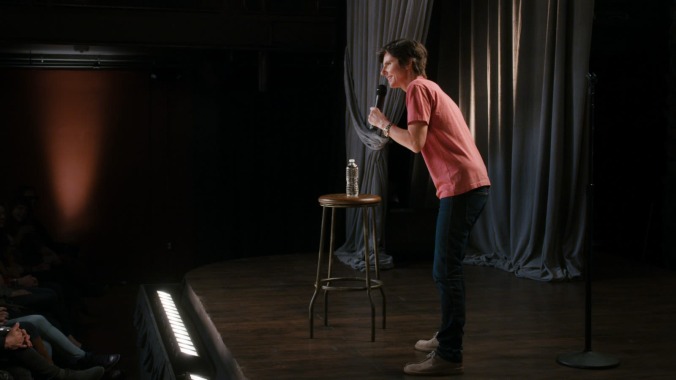
Notaro maintains this great back-and-forth throughout Happy To Be Here, throwing out seemingly unrelated questions and premises, and accepting the eager responses. The whole thing is exhilarating; the audience is eating out of her palm, even as several minutes lapse between setup and punchline. Early on, Notaro, who once worked as a temp, relates a story about her worst assignment. Every new reveal from the comedian is followed by some guess from the crowd, which then becomes part of the bit; it’s one of several instances in which Notaro’s stories snowball, gathering and discarding punchlines. But she’s not testing out material—she’s turning their expectations on their heads. Notaro knows everyone’s waiting (or worried) for the story to get worse, whether the setup is foreboding or innocuous. Her deliberate delivery and joke structure build the anticipation, so that we never know if we’re about to hear about another terrible day in the life of Tig or exult in her experiences as a new mother. [Danette Chavez]
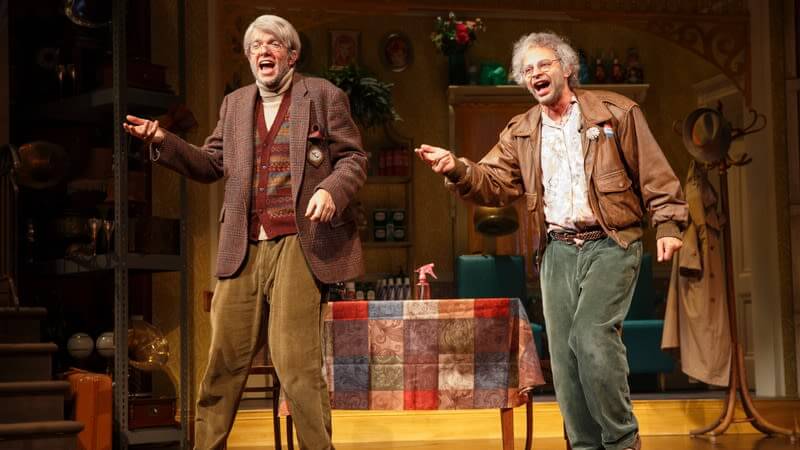
Gil Faizon (Nick Kroll) and George St. Geegland (John Mulaney) have lived lives far more charmed than their fictional biographies let on. The bespectacled working actor/stand-in model for mashed potatoes and his best friend—a writer whose personal history has significant overlap with those of accused murderers Michael Peterson and Robert Durst—have come far from their origins as Upper West Side caricatures hosting a comedy night in the East Village. They became breakout characters on , after which he and Mulaney mounted off-Broadway, touring, and Broadway runs of Oh, Hello, a stage show that inhales deeply from George and Gil’s mountainous reserves of self-aggrandizement, abnormally pointed malice, and penchant for idiosyncratic pronunciation. Or, as they’d probably put it, a “pin-chint” for “idd-yo-syncretic” pronunciation. Across live performances, taped sketches, numerous podcast and talk show appearances, and they’d brag about loudly enough so everyone in the diner can hear, Kroll and Mulaney have turned the tuna-crusted, Steely Dan-loving equivalents of Statler and Waldorf into darlings of the comedy world. Next stop: A Netflix special recorded during Oh, Hello’s stand at New York’s Lyceum Theater. [Erik Adams]
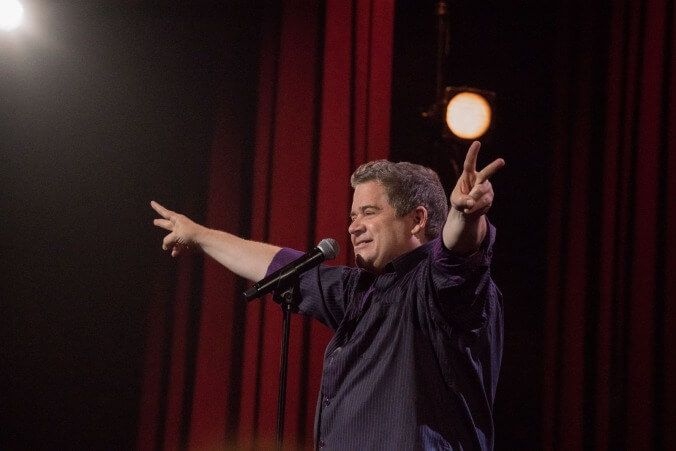
When Oswalt’s wife, true crime writer Michelle McNamara died unexpectedly in April 2016, the comic was left with a young daughter, a life unthinkably transformed, and a mind that he’d trained for decades to transform pain into comedy. Well, he did that. It’s tempting to call what Oswalt does in the second half of Annihilation cathartic, but his material about finding his wife dead, having to tell his young daughter, simmering in impotent rage at well-meaning platitudes, and coping with a mind already and famously prone to depression and despair, is more affecting because of how carefully honed and tended it is. Tying his opening political material to this meditation on encroaching madness in the face of horror works so well because of how Oswalt frames the chaos of Trump’s America as being right at home in a mind occasionally questioning whether he’s, in fact, the one who died. Speculating that perhaps his mind fled to an even worse reality, Oswalt says, “If I invented a hellscape, it would kind of look like this.” This isn’t a howl of rage and sorrow—he’s done all that already. Oswalt, for better or for worse from his point of view, has a comic’s soul, and what emerges onstage here is the raw material of horror shaped into terribly beautiful and hilarious shapes. It’s grief made art. [Dennis Perkins]

Stand-up specials rarely begin with a comedian simply taking the stage and launching into the comedy. There’s almost always some sort of throat-clearing preamble, like the pre-game show parody the opens the Sklar Brothers’ recent Wbat Are We Talking About, or George Carlin chatting with his cab driver on the way to his show in What Am I Doing In New Jersey? Sometimes these skits are amusing, but more often than not they feel like an obligatory annoyance to be endured before the main event begins. When it comes to stand-up, keeping it simple is usually the best policy: Just give us a comedian with a microphone in front of an audience, and spare us the bells and whistles.There are exceptions, of course, as Chelsea Peretti proves in her new Netflix special, One Of The Greats. Peretti and director Lance Bangs have fashioned a mock-grandiose opening befitting the special’s title: As she approaches the Palace of Fine Arts in San Francisco on a motorcycle, Peretti tells us in voice-over about the trials and tribulations that have brought her to this point, including “countless hour-long specials where I looked like a damn fool trying to be something I wasn’t.” What follows is a meta montage of Peretti trying on different personas in specials that never were, including the Hoo-Ha Network’s “Bitch, Please” and HOBO’s “It’s Go Time,” in which she dons an Eddie Murphy-style red leather suit and pumps up the crowd with endless repetitions of the titular catchphrase.Once Peretti’s stand-up set begins, the tinkering with the format continues in mostly unobtrusive ways, mainly through audience cutaways revealing a crowd peppered with dogs, babies, and couples putting on excessive displays of public affection. For the most part these bits are seamlessly integrated into the flow of the show, but the shots of a clownsuit-clad Peretti taunting herself from just offstage are a bit too disruptive. Fortunately these are few and far between. [Scott Von Doviak]

Richard Pryor: Live In Concert, the first feature to focus on a single stand-up set, contains one of the most electric performances ever captured on film. On a bare, under-lit stage adorned only by occasional starbursts of lens flare, Pryor—dressed in dark slacks and a sweat-drenched red shirt—covers the whole spectrum of comedy. He doesn’t do bits; instead, he seems to channel his subjects—blacks, whites, parents, children, animals—like a spirit medium. It’s both the original stand-up movie and the best. [Ignatiy Vishnevetsky]
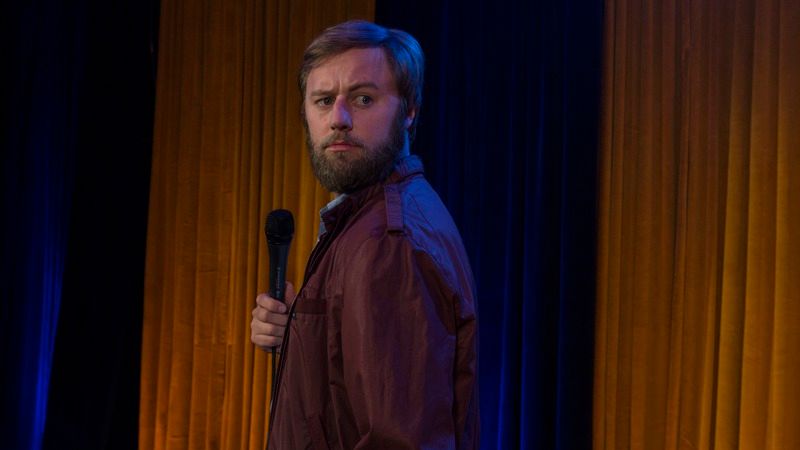
One of the great, subtle pleasures of First Time is how often, unintentional or not, director Scott Moran catches faces in the crowd who don’t entirely “get” it yet. Scovel excels at the type of joke—perfected by Andy Kaufman, run into the ground by , then revived by Reggie Watts—in which the sheer length of the setup becomes the joke itself. (Scovel was a writer on for three years, and it shows.) So we get to watch on two layers, as Scovel cracks himself up piling absurdities on top of each other, and as even the most stone-faced audience members start to crack as well. We’re watching Scovel earn these laughs, one autoerotic-asphyxiation joke at a time. [Vinnie Mancuso]
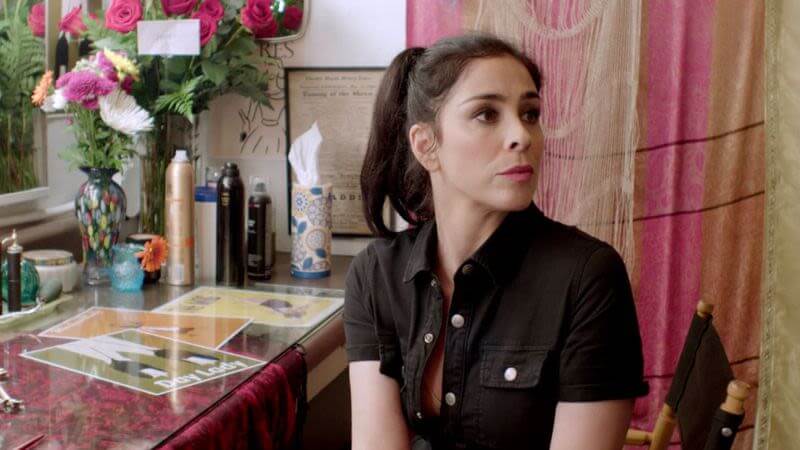
Silverman has always been self-aware, but in Speck that self-awareness feels less prankish and more authentic. For her, this means making some digressions, and pointing out that she’s making digressions: “Put a pin in that,” she says repeatedly when pausing her material for a sidebar in what becomes a sort of low-key running gag. This hour-plus of material doesn’t have the effortless storytelling flow of truly breathtaking stand-up, but the self-commentary adds a compelling wrinkle to her style. In the past, she would hone one-liners out of sexism or racism, unafraid to make herself look terrible. Here, when she makes a joke about validating Jewish stereotypes, she pauses to admonish, then excuse herself: “Did it get a laugh? Yes? Okay.” [Jesse Hassenger]
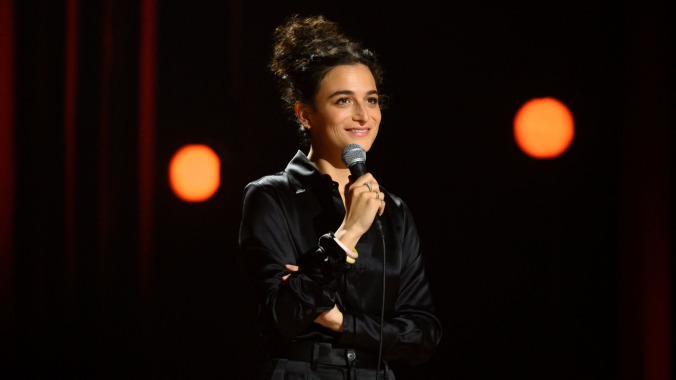
There’s not another stand-up special that immediately comes to mind where the person on stage is enjoying not just themselves, but their punchlines as much as Slate does during Stage Fright, her first-ever stand-up special streaming now on Netflix. Where some textbook comedy specials fall flat because of over-rehearsed jokes or stiffness, Stage Fright succeeds because it oozes authenticity, thanks in part to a combination of Slate’s overwhelming joy and a display of deep vulnerability. Directed by Slate’s frequent collaborator Gillian Robespierre (, ), it alternates between a live stand-up set filmed at the Gramercy Theatre, footage from Slate’s childhood, and interviews with her family in the house where she grew up. The result is a heartwarming, hilarious, and revealing hour that encapsulates all the good and bad that have made Jenny, Jenny. [Brianna Wellen]
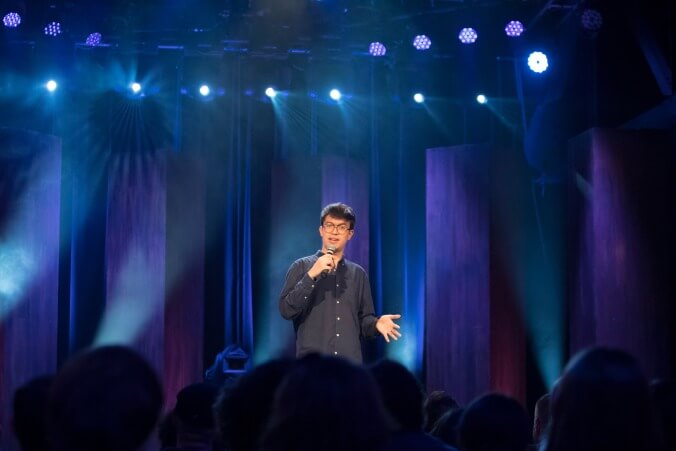
Netflix’s quarter-hour stand-up series is a sampler platter, but taking in such a wide variety of comedy in such quick succession manages to get some of the medium’s finer points across. You get to see how different comedians are choosing to process the same subject matter—like the #MeToo material in Michelle Buteau’s and Jak Knight’s episodes—and how a crop of up-and-comers are rethinking the conventions of stand-up, figuratively and literally from top to bottom. I’ve probably watched the opening to the Phil Wang episode four of five times now, and each time I’m tickled by the way he attacks a major hurdle for a series like The Comedy Lineup—the audience not knowing who the fuck he is—with a bunch of corny fake nicknames and showbiz clichés that suggest the audience knows exactly who the fuck he is. (“Quit rubbin’ your eyes, buddy. Believe ’em, it’s me: Phil Wang!” has been playing on a loop in my head for a week.) []
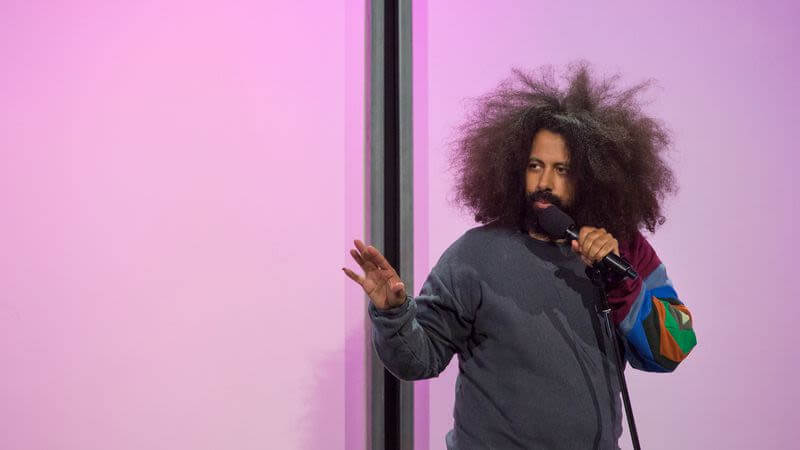
A Reggie Watts stand-up special is like a TED Talk by a mad scientist. (Watts has a TED Talk, leaving the audience there as puzzled as it was entertained.) With his enormous puff of waving, unruly hair, non sequiturs and digressions, voices and accents, and elaborately bizarre musical segments, Watts gives the impression that his performance is either a deliberate, rambling put-on or communication on a plane we’re only able to comprehend in snatches. At his best, Watts does both, his experimental comic premises cohering into something like improbable (and funny) profundity. [Dennis Perkins]
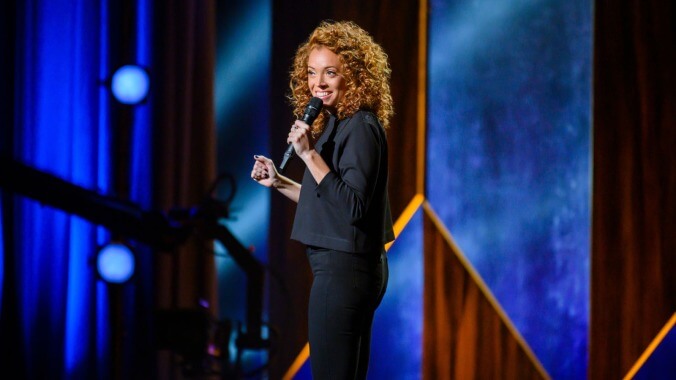
Joke Show features some of Wolf’s finest and subtlest joke construction; she earns early laughs with the bit about Instagram and otter rape—it’s probably best if you hear it for yourself—which doubles as a statement on the presumption of familiarity that access (read: technology) gives us. This opens up a dialogue on how caustic the discourse has gotten, especially online: “You don’t have to have a stance on everything… We get mad before we get logical,” Wolf says. The observation that no one is really listening anymore is a common one outside of Wolf’s stand-up, but thankfully, she doesn’t rest there. Wolf moves onto period jokes, which delivered some inspired moments in Nice Lady, but that recapitulation is actually a feint, because the joke that lands at the 41-minute mark is an all-timer. It’s also bound to hurt the feelings of anyone who’s ever felt they were helping marginalized people because “we’re all in the same boat.” [Danette Chavez]
Plenty of comedy sets have pulled back the curtain on married life and parenthood, but in Hard Knock Wife, Ali Wong burns the whole stage down. The actor-comedian is “little but fierce” in her second Netflix special, which also happened to take place during her second pregnancy. She quickly disabuses viewers of the notion that she might have mellowed out sometime between breastfeeding her first daughter and becoming so famous that she now has to worry about her penchant for haggling with Craigslist sellers. But Hard Knock Wife’s most inspired moments come from Wong’s ability to make the natural sound almost alien, and sometimes even downright terrifying. When she digs into the birthing process and recovery, you’ll either be in complete awe of the human body or in the fetal position. []
 Keep scrolling for more great stories from A.V. Club.
Keep scrolling for more great stories from A.V. Club.
